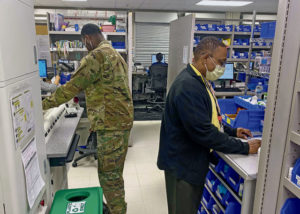
Public health officials in Europe are concerned about a recent trend of service members who have taken a controlled substance prescription more than six months after it was prescribed, resulting in a positive urinalysis, and something that could be subject to disciplinary action.
“Department of Defense Instruction 1010.16, published in June 2020, specifies that a controlled substance prescription expires after six months and any controlled medication used without a valid prescription will be considered illegitimate,” said Col. Paul Kassebaum, the chief of the pharmacy at Landstuhl Regional Medical Center. “Illegitimate use of a controlled substance is subject to disciplinary action.”
Service members undergo at least one random drug test per year.
“For any positive urinalysis that could be related to a medication, there is a medical review process to determine if the positive urinalysis was due to a prescribed medication,” said Kassebaum. “If the medication was prescribed, the use was legitimate and there will not be disciplinary action. Alternatively, if the medical reviewing officer does not see a valid prescription in the medical record that could have caused the positive urinalysis, use will be considered illegitimate.”
Kassebaum said an example would be if someone has surgery and takes prescribed Percocet for pain, they will have a positive urinalysis for opioids. However, the medical reviewing officer will review the medical records, see there was a valid opioid prescription, and determine it was legitimate medical use. Take the same patient who received Percocet for surgery. Nine months later they hurt their back. They decide to take a leftover Percocet to avoid the hassle of making a medical appointment. The subsequent positive urinalysis would not be due to legitimate use since the prescription was expired and no longer valid.
“Pharmacy staff counsel patients to not use a controlled substance more than six months after it was prescribed,” added Kassebaum. “Patients picking up medications confirm this when they sign for the medication.”
Kassebaum advises that medications should only be taken as prescribed and only for as long as they are needed. If you have a new issue, do not assume that you can safely use old medications for treatment. You should be assessed by a provider and then follow their guidance based on that assessment.
Unused or expired medications can be taken to the nearest Medical Treatment Facility pharmacy for safe and secure disposal.


